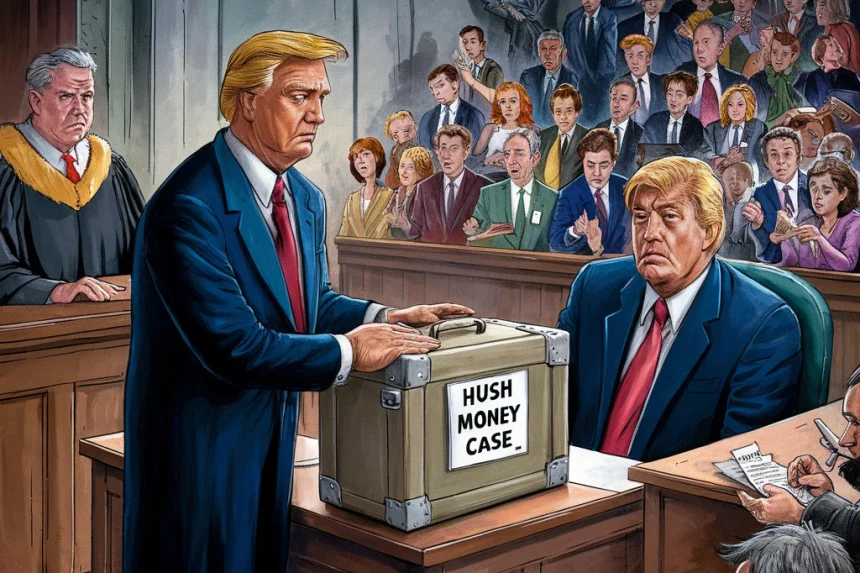May 27, 2024
As closing arguments begin Tuesday in the high-profile hush money trial of former President Donald Trump, both sides face the formidable task of persuading the jury to side with their narrative after weeks of complex testimony and evidence presentation.
The Case So Far
Donald Trump is on trial for allegedly orchestrating and concealing hush money payments during his 2016 presidential campaign. The charges, brought by Manhattan District Attorney Alvin Bragg’s office, include 34 felony counts of falsifying business records. The trial, which has been ongoing since mid-April, has seen a parade of witnesses and extensive documentation aimed at proving Trump’s involvement in the scheme.
The Final Pitch
Prosecutors will begin their closing arguments on Tuesday, aiming to tie together the multitude of evidence and testimony presented over the past several weeks. They need to provide a clear and compelling narrative that convinces the 12 jurors of Trump’s guilt beyond a reasonable doubt. This is no small feat given the intricacies of the case, which have often delved into the mundane details of business recordkeeping.
Elie Honig, a senior legal analyst at CNN and former federal prosecutor, highlighted the importance of this stage: “There’s plenty of moments during trial where you’re getting a piece of testimony or you’re introducing a document, and the jury is thinking, ‘Well, how does this fit in?’ That’s unavoidable. It’s your job at closing to weave it all together, and to make it make sense.”
Strategy and Challenges
The prosecution will likely focus on the coherence of their case, arguing that each piece of evidence, from invoices to checks, interlocks to form a damning picture of deliberate misconduct. They need to reinforce that the 34 falsified documents — comprising 11 invoices, 12 vouchers, and 11 checks — were used to reimburse Trump’s former lawyer Michael Cohen for the $130,000 hush money payment, “grossed up” for taxes to $420,000 in 2017.
The prosecution’s narrative will emphasize that Trump signed nine of these checks, while the other two were signed by his associates. They will assert that Cohen’s testimony, despite his past dishonesty, is backed by substantial documentary evidence.
Karen Friedman Agnifilo, a former top prosecutor in the Manhattan District Attorney’s Office, noted, “Prosecutors will argue that most of the people who testified for their case were ‘Trump witnesses … who you would expect to be friendly to him.’ They’ll stress that despite their flaws, the corroboration from documents and records makes their case solid.”
The Defense’s Position
Trump’s defense team will present their closing arguments first, aiming to dismantle the prosecution’s case by questioning the credibility of key witnesses like Michael Cohen. They will argue that Cohen’s history of dishonesty undermines his testimony, and they will challenge the prosecution’s narrative by suggesting that the documents and testimonies do not conclusively prove Trump’s intent to commit a crime.
The defense called only two witnesses, including a paralegal to verify phone records and attorney Robert Costello, who had discussions with Cohen about representing him in 2018. Their strategy hinges on casting reasonable doubt on the prosecution’s claims.
Jury Instructions and Deliberation
After the closing arguments, Judge Juan Merchan will instruct the jury on the legal standards they must apply when considering the charges against Trump. These instructions are crucial, as they guide the jurors in their deliberations, which are expected to begin on Wednesday.
The jurors have been allowed to take notes throughout the trial and can request to have testimony read back to them if needed. This ensures they can revisit any part of the trial they find unclear or crucial for their decision-making.
High Stakes and Historic Implications
Both the prosecution and the defense are aware of the historic nature of this trial. Trump, facing potential sentences ranging from probation to up to 20 years in state prison if convicted on all counts, continues to be a polarizing figure. The outcome of this trial could have significant implications for his political future and the broader political landscape in the United States.
Bernarda Villalona, a former prosecutor, remarked, “The prosecution and the defense are going to give the closing argument of their career.” The meticulous crafting of these arguments is not just about winning the case at hand but also about securing their legacies in this landmark trial.
Reflecting on Key Witnesses and Evidence
The trial has featured testimony from 20 prosecution witnesses over 19 days, including high-profile figures like former Trump attorney Michael Cohen and adult film actress Stormy Daniels. Their testimonies, alongside various business records, aim to demonstrate a coordinated effort to conceal payments intended to influence the 2016 election.
Cohen’s role has been particularly contentious. Prosecutors argue that his involvement in the scheme is corroborated by extensive documentation, while the defense points to his admitted history of lying to question his reliability.
Conclusion
As the trial reaches its final stages, the focus will be on how effectively each side can encapsulate weeks of detailed testimony and evidence into a persuasive closing argument. The jurors’ decision will hinge on their ability to sift through the complexities of the case and determine whether the prosecution has met its burden of proof.
The outcome of this trial will not only affect Donald Trump but also set a precedent for the accountability of public figures in matters of legal and ethical conduct. As both sides prepare to make their final appeals, the world watches with keen interest, awaiting the jury’s verdict in this unprecedented case.
For More Updates: https://www.timelinetale.com/







